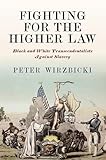Fighting for the Higher Law : Black and White Transcendentalists Against Slavery / Peter Wirzbicki.
Material type: TextSeries: America in the Nineteenth CenturyPublisher: Philadelphia : University of Pennsylvania Press, [2021]Copyright date: ©2021Description: 1 online resource (384 p.)Content type:
TextSeries: America in the Nineteenth CenturyPublisher: Philadelphia : University of Pennsylvania Press, [2021]Copyright date: ©2021Description: 1 online resource (384 p.)Content type: - 9780812297898
- African American abolitionists -- History -- 19th century
- Antislavery movements -- New England -- History -- 19th century
- Transcendentalism (New England) -- History -- 19th century
- Transcendentalists (New England) -- History -- 19th century
- History-United States
- HISTORY / United States / 19th Century
- African Studies
- African-American Studies
- American History
- American Studies
- 326.8097409034 23
- E445.N5 W57 2021
- online - DeGruyter
| Item type | Current library | Call number | URL | Status | Notes | Barcode | |
|---|---|---|---|---|---|---|---|
 eBook
eBook
|
Biblioteca "Angelicum" Pont. Univ. S.Tommaso d'Aquino Nuvola online | online - DeGruyter (Browse shelf(Opens below)) | Online access | Not for loan (Accesso limitato) | Accesso per gli utenti autorizzati / Access for authorized users | (dgr)9780812297898 |
Frontmatter -- Contents -- Introduction -- Chapter 1 Transcendentalism in Black and White -- Chapter 2 The Latest Forms of Infidelity -- Chapter 3 The Cotton Economy and the Rise of Universal Reformers -- Chapter 4 Fugitive Slaves and the Many Origins of Civil Disobedience Theory -- Chapter 5 Heroism, Violence, and Race -- Chapter 6 A War of Ideas -- Epilogue -- Notes -- Index -- Acknowledgments
restricted access online access with authorization star
http://purl.org/coar/access_right/c_16ec
In Fighting for the Higher Law, Peter Wirzbicki explores how important black abolitionists joined famous Transcendentalists to create a political philosophy that fired the radical struggle against American slavery.In the cauldron of the antislavery movement, antislavery activists, such as William C. Nell, Thomas Sidney, and Charlotte Forten, and Transcendentalist intellectuals, including Ralph Waldo Emerson and Henry David Thoreau, developed a "Higher Law" ethos, a unique set of romantic political sensibilities—marked by moral enthusiasms, democratic idealism, and a vision of the self that could judge political questions from "higher" standards of morality and reason. The Transcendentalism that emerges here is not simply the dreamy philosophy of privileged white New Englanders, but a more populist movement, one that encouraged an uncompromising form of politics among a wide range of Northerners, black as well as white, working-class as well as wealthy. Invented to fight slavery, it would influence later labor, feminist, civil rights, and environmentalist activism.African American thinkers and activists have long engaged with American Transcendentalist ideas about "double consciousness," nonconformity, and civil disobedience. When thinkers like Martin Luther King, Jr., or W. E. B. Du Bois invoked Transcendentalist ideas, they were putting to use an intellectual movement that black radicals had participated in since the 1830s.
Mode of access: Internet via World Wide Web.
In English.
Description based on online resource; title from PDF title page (publisher's Web site, viewed 01. Dez 2022)


